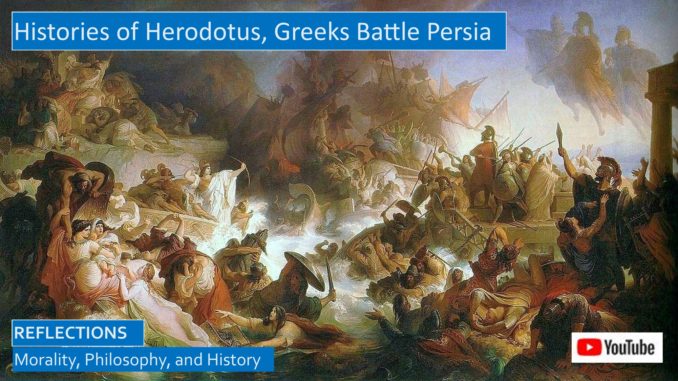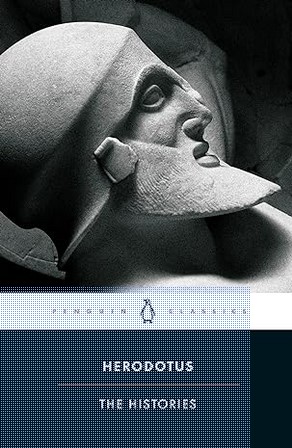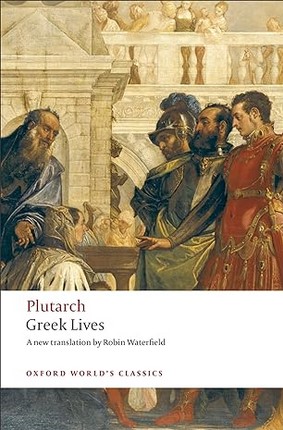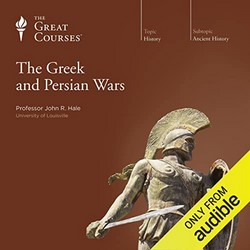
Why did Herodotus write his Histories?
Herodotus tells us in the first paragraph that he wrote his Histories “so that human achievements may not be forgotten in time, and great and marvelous deeds, some displayed by Greeks, some by barbarians, may not be without their glory; and especially to show why the two peoples fought with each other.”
We pondered in our first video/blog how, just as in the Iliad, the Greek soldiers and sailors in the Histories of Herodotus fight for cleos, or glory, and warriors in these warrior societies are immortalized by their great and marvelous deeds on the battlefield. Herodotus is interested in recording any mighty deeds of both the Greeks and the Persians, although the glory was earned mostly by the Greeks.
http://www.seekingvirtueandwisdom.com/herodotus-histories-of-persia-egypt-and-scythia-before-the-greco-persian-wars/
YouTube: https://youtu.be/YwUojwMIQEw
Please view the YouTube video for this blog: https://youtu.be/JjNcyLo54ko
Youtube script with more book links: https://www.slideshare.net/BruceStrom1/histories-of-herodotus-the-greeks-defeat-the-mighty-persians-in-the-grecopersian-wars
In the first four book of his Histories, Herodotus treats us to a tour and snippets of the histories of Persia and its conflicts with Scythia and Egypt, but the last five books are more familiar history of the Greco-Persian Wars.
The Greco-Persian Wars begin with conflicts in Ionia, the Greek-speaking West Mediterranean coast of the Persian Empire in what is today Turkey. It is in Ionia that Athens first antagonizes the Persian King Darius, giving him an excuse to mount a quick raid on Greece, hoping to add it to his Empire.
WHY THE GREEKS OVERWHELMED THE PERSIANS ON LAND AND AT SEA
We need to understand how the Greeks and Persian fought on land and at sea to understand the battles in the Greco-Persian Wars. The biggest difference was in training, the Greeks had, by far, the best trained hoplite infantry and trireme naval forces in the ancient world.
Hoplites fought in tight formation, interlocking shields in the left hand, long spears and swords yielded in the right hand, poking through the lines at the enemy. Hoplite soldiers were drawn from the middle and upper classes, they had to purchase the hoplite armor, the helmet, shield, breastplate, and greaves for the legs. Hoplite soldiers needed constant drilling and conditioning, the Spartan hoplite infantry soldiers were full-time soldiers, but many other Greek city-states, in particular Athens, Platea, Corinth, and Thebes, had equally skilled hoplite soldiers, likely training monthly, much like our army reserve units. If two Greek city-states fought and both their hoplite forces kept in formation, often the contest was a draw, but if one side broke rank and fled, the fleeing troops were often massacred, leading to very lopsided casualty counts.[1]
In contrast, the Persian infantry were not as well trained, they had but a wicker shield, short spear, sword, and a bow and arrow. They were no match for the Athenian hoplites. But the Persian forces included cavalry forces and archers, but these were most effective when fighting on flat plains, whereas much of Greece is hills and mountains.[2] Herodotus does not mention any Greek Ionian hoplites fighting for the Persians, he hints that the Greek Ionians had lost their fighting spirit under Persian subjugation.
In the Greek navy, the triremes had three long stacked rows of rowers who had to row in unison, with a heavy ram below the waterline at the front of the ship. A typical trireme had about 170 rowers, plus a handful of hoplite infantry ready on deck. The favored strategy was to ram the middle of the opposing ship, sinking it, or quickly try to pass closely to the opposing ship, withdraw your oars in unison, and shear off the oars of the opposing rowers. Once ships were entangled, then the hoplites could board them and engage in hand-to-hand combat.[3] Greek navies fighting on both sides rowed triremes, several references in Herodotus state that it was difficult to tell them apart in the thick of battle.
These naval fighting strategies required even more drill and conditioning; the Athenian navy were likely serving full-time so they could maintain the conditioning required to row in unison during a day-long battle. Slaves were never employed as rowers in the ancient world. Since rowers did not need to purchase any equipment, many were from the lower classes, the existence of this large lower to middle class navy favored the development of democracy in Athens.
The Histories of Herodotus were meant to be read aloud, ancient books never contained battle maps and graphics. Historical reconstructions are based on clues from the ancient written sources of the battle, plus a knowledge of the geography and archaeology of the battlefield. Plus, ancient audiences already had a general understanding of how the major battles progressed. But Dr Wikipedia can help modern readers on how exactly we think the battles progressed, complete with guessed positions of battle lines in the different phases of the battles.
PERSIAN ENVOYS FOOLISHLY DEMAND EARTH, WATER, AND WOMEN
Early in the fifth book, the Persian general Megabazus “sent to King Amyntas of Macedonia a demand for earth and water, as a sign of his submission to Darius.” Macedonia was in Northern Greece and close to Turkey, its closeness to Persia meant this was a wise concession. This demand was not refused, and Amyntas invited the seven Persian envoys “to a magnificent dinner, entertaining them most hospitably. After dinner, while the wine was still going around, one of the Persians said, ‘At important dinners like this, my Macedonian friend, it is our custom in Persia to get our wives and mistresses to come and sit with us in the dining-room.’”
The footnotes confirm that this was not a Persian custom. Amyntas was concerned but cautious, but not his headstrong son, Alexander, who suggested his father allow him to entertain these Persians. Amyntas warned him, “I beg you not to do these men any mischief; for if you do, you will ruin us all. Have the courage to endure the sight of their behavior. As for myself, I will leave the room as you suggest.”
Prince Alexander turned to the Persian envoys, “My friends, these women are entirely at your service; you may take to bed any of them who you choose, indeed, you can bed all of them. You have but to say the word. Now, however, as it is nearly bedtime and you are, as I observe, agreeably primed with drink, perhaps you will allow me to send them away to take a bath, after which you may have them again.”
We see the themes Herodotus and indeed, Homer in the Iliad, comes back to, how hubris can make the gods angry, withdrawing their support of the endeavors of men, how the arrogance of hubris can humble even the bravest of warriors. We also see how the Persians are no longer the warrior race they once were under King Cyrus, how they have grown soft, how they have lost the warrior spirit, how they disregard the fighting spirit of the Greeks at their own peril. We see how the Persians do not keep up their guard in meetings when they must dine with the enemy in hostile enemy camps, a danger we explored in our video and blog on the Iliad. We also see echoes of the story of Jacob and Laban, how Laban got Jacob so drunk at his wedding dinner that he swapped his older daughter Leah for his younger daughter Rachel, with whom Jacob was madly in love, and Jacob did not even notice until morning, so drunk was he.
Iliad, Blog 3, Visiting the Enemy Camp, Greeks vs Indians
http://www.seekingvirtueandwisdom.com/iliad-blog-3-visiting-the-enemy-camp-greeks-vs-indians/
The Warrior Cultures of the Iliad and the American Indian, Bravely Visiting the Enemy Camp
https://youtu.be/ynIx-AVI2f8
When Prince Alexander brought out the freshened ladies to his Persian envoy guests, they did not notice that under the flowing robes were not pretty young ladies, but rather young warriors armed with sharpened knives. Herodotus tells us, “That was the end of the Persian envoys to Macedon, and of their servants too, and carriages, and a great deal of baggage of every kind, all disappeared together.” Evidently the Persian commander, Bubares, was impressed by this brave show of defiance, because Amyntas “kept the affair dark by giving Bubares a large sum of money and his own sister Gygaea. In this way the murder was hushed up and never discovered.”[4]
This most impetuous Prince Alexander of Macedon was a distant ancestor of another impetuous monarch, Alexander the Great, who conquered Persia and part of India a century and a half later.
BEGINNING OF EVILS FOR THE GREEKS AND BARBARIANS
Now we will discuss “the ships that were the beginning of evils for Greeks and barbarians,” as Herodotus says.
The Persians had already conquered the many Greek colonies on the Western Mediterranean shores of Asia Minor. Many of these Greeks wanted to be free of Persian domination, Aristagoras of Miletus traveled to Sparta, speaking to their assembly, “We beg you, in the names of the gods of Greece, to save from slavery your Ionian kinsmen. It will be an easy task, for these foreigners have little taste for war, and you are the finest soldiers in the world. The Persian weapons are bows and short spears; they fight in trousers and turbans, that shows how easy they will be to beat!” He must not have realized that the Spartans are, well, spartan, little influenced by promises of wealth, for he continues, “The Persians have everything, gold, silver, bronze, elaborately embroidered clothes and beasts of burdens and slaves.”
“King Cleomenes stopped Aristagoras from saying any more of the road to the Persian regional capital city of Susa. ‘Milesian stranger, you must leave Sparta before sunset. Your proposal to take Lacedaemonians a three month’s journey from the sea is a highly improper one.’”[5] Spartans did not have the hubris generated by greed.
At the public assembly at Athens Aristagoras had more luck, reminding them that his Miletians were descended from Athenian colonists, they sent “twenty ships to Ionia, under the command of Melanthius, a distinguished Athenians.” In their brief adventure they landed in Miletus, then attacked Sardis, burning it to the ground. “In the conflagration of Sardis a temple of Cybebe, a goddess worshiped by the natives, was destroyed, and the Persians later made this a pretext for their burning of Greek temples” when they invaded Greece. In the ensuing battle with the enraged Persians the Greeks were badly beaten, “after this battle the Athenians would have nothing to do with the Ionian rebellion.”[6]
After the death of Aristagoras the Ionian rebellion continued, the Persians gathered a fleet to defeat the Ionian rebels. But to defeat the Persians, the Ionian fleet, assembled from all the unruly city-states of Ionia, had to fight as a disciplined unit, the Phocaen commander Dionysus was chosen to whip them into fighting shape.
Herodotus tells us, “Every day he had ships and crews out for training, making the fleet sail in line ahead, keeping the troops on board under arms practicing the oarsmen on the maneuver of ‘breaking the line’” to shear off the oars of their opponents, or ramming and sinking them. “Thus, the men got no rest from morning to night.”
After many days the men started to grumble, “What god have we offended to be punished like this?” “Anything would be preferable to the misery we now endure, if it is a choice between two sorts of slavery, then the one we are threatened with, however bad it turns out to be, could hardly be worse than what we are putting up with now. Now then, let us refuse to obey his orders.”
“It was no sooner said than done. Every seaman in the fleet refused duty.” “They lounged about in the shade and refused to go aboard their vessels or continue their training in any way whatever.”
This is the equivalent of the foolish teenagers who ask themselves, Why study? Why go to college? Why not party? The Persians did come, but to win in naval battles in the ancient world requires drilled and disciplined rowers, the Ionians refused to do the work that Athenian crews accepted as their lot, and they were roundly defeated by the Persians and enslaved.[7] So ended the Ionian revolt.
KING DARIUS INVADES GREECE
In his first attempt to invade Greece, King Darius sailed his fleet close to shore following his marching army. When they reached Mount Athos they encountered treacherous winds, the winds blowing off the high mountain down to the sea can be fierce. Herodotus tells us, when the ships “rounded the promontory, they were caught by a violent northerly gale, which proved too much for the ships. Many were driven ashore and wrecked on Athos, reports say three hundred ships were lost with over twenty thousand men. The sea in by Athos is full of monsters, and the ships that were not dashed upon the rocks were seized and devoured. Many men, unable to swim, were drowned; others died of cold.” Perhaps these monsters were sharks.
The army also faced heavy casualties when the Brygi, a Thracian tribe, attacked their camp at night. Herodotus tells us, “the whole force returned to Asia in disgrace.”[8]
King Darius instructed his servant to whisper in his ear each time he sat down for dinner, “Remember Athens.” [9] When King Darius invaded Greece again in another campaigning season the navy cut across the seas to avoid the treacherous winds blowing off Mount Athos. As he marched down the Greek coast, many cities showed submission by giving earth and water, others were put under siege and subdued. The Persians decided to disembark at Marathon, and the Athenian hoplites hurried to meet them.
The Athenians sent their runner Pheidippides to Sparta, his message was, “Men of Sparta, the Athenians ask you to help them, and not to stand by while the most ancient city of Greece is crushed and enslaved by a foreign invader.” But the Spartans were in the middle of a religious festival, they said they “could not take the field until the moon was full, they did not wish to break their law.” The Athenians would have to face the Persians alone, assisted only by a contingent from Platea, a small city-state northwest of Athens.
The Athenians were outnumbered, their center was weak since they had to extend their infantry hoplite line to match the Persian line. The Persians did not deploy their cavalry, maybe they were still on the ships, maybe the marshes on both sides of the battlefield made cavalry useless. Herodotus tells us, “The Persians, seeing the attack developing at the double, prepared to meet it, thinking it suicidal madness for the Athenians to risk an assault with so small a force, rushing in with no support from either cavalry or archers. Well, that was what they imagined; nevertheless, the Athenians came on, closed with the enemy all along the line, and fought in a way not to be forgotten; they were the first Greeks, so far as we know, to charge the enemy at a run, and the first who dared to look without flinching at Persian dress and the men who wore it; for until that day came, no Greek could hear even the word Persian without terror.” The Athenian center was pushed back, but then the Athenian wings advanced, trapping the Persian enemies, “triumphant, they chased the routed enemy, and cutting them down until they came to the sea, and men were calling for fire and taking hold of the ships.”
Over six thousand Persians were slaughtered, the Athenians only lost several hundred men. Even though these casualties may have been exaggerated, the losses were lopsided when an opposing army broke formation and fled. The Athenians captured seven ships; the rest sailed off to attack the undefended city of Athens. After fighting all day, the “Athenians hurried back with all possible speed to save their city and succeeded in reaching it before the arrival of the Persians.” “When the Persian fleet appeared, it lay at anchor for a while, then sailed back to Asia.”[10]
ARMY AND NAVY OF KING XERXES MARCHES AND SAILS TO GREECE
Since he led the forces to overthrow his hapless predecessor, King Darius was a warrior king like King Cyrus only a few generations before, though he became soft as he enjoyed the wealth and luxury of the Persian court. His son, King Xerxes, was the first Persian king whose entire life was spent at court surrounded by luxury and sycophants, it was unthinkable for him to lead the Persian troops in battle. Rather, he would sit on throne-like dais built for him to observe the tides of battle much like he was a spectator at the Olympic games, which meant that is army and navy were more concerned about impressing the great king with their bravery rather than executing sound tactical maneuvers that win battles.
King Darius spent three years preparing for another invasion of Greece when a revolt broke out in Egypt, and he died during the campaign. His son Xerxes turned his attention back to Greece after putting down the Egyptian rebellion. This invasion was launched seven years after Marathon and Salamis.
The characters of Herodotus remind their Persian kings over and over again that they underestimate the Greeks at their peril. King Xerxes called a meeting to debate whether to invade Greece once again. Embedded in his long speech egging on King Xerxes, his general Mardonius asks this, “Have we anything to fear from the Greeks? The size of their army? Their wealth? The question is absurd, we know how they fight, we know how slender their resources are.”[11]
There is an interesting moral lesson when Artabanus argues against invading Greece, Herodotus believes that it is an act of hubris to underestimate and slander your opponent. He addresses Mardonius, “By slandering the Greeks you increase the king’s eagerness to make war on them, as this is the very thing you most passionately desire. Heaven forbid it happen! Slander is a wicked thing.” “The slanderer is guilty of speaking ill of a man behind his back; and the man who listens to him is guilty in that he takes his word without bothering to find out the truth.”[12]
Artabanus warns Xerxes that the size of his forces and the great distance to Greece may work against him. “Let me tell you, my king, of your other great enemy, the land. If you meet with no opposition, the land itself will become more and more hostile to you the further you advance, drawn on and on. The mere distance will ultimately starve you.” Although his army was not two and a half million as Herodotus states, it surely numbered close to a hundred thousand, feeding that large a host was a challenge in the ancient world, Herodotus tells us of his army drinking dry the streams in their path.
Xerxes counters with some Dale Carnegie responses: “I would much rather take a risk and run into trouble half the time than keep out of trouble by being afraid of everything.” “It was by taking risks that my ancestors brought us to where we stand today. Only by great risks can great results be achieved.”[13]
The army and navy who would march and sail to Greece would be many times larger than the army of Darius the Greeks defeated, and the preparations for the war would be more thorough. Xerxes decided to cut a canal across the isthmus at Mount Athos so his ships could avoid the treacherous seas at the tip of the peninsula. Many historians viewed this as another lie told by Herodotus until archeologists found the buried remains of this ancient canal. Herodotus sees this as hubris, “It was mere ostentation that made Xerxes have the canal dug, he wanted to show his power and to leave something to be remembered by.” The canal was wide enough for two triremes to pass side by side.[14]
Herodotus accuses Xerxes of other acts of hubris against nature when he lashed boats together at the Dardanelles, tying planks on the decks to form a bridge from Asia to Europe. Herodotus tells us, “the work was successfully completed, but a storm of great violence smashed it up and carried everything away. Xerxes was very angry when he learned of the disaster and gave orders that the Hellespont should receive three hundred lashes and have a pair of fetters thrown into it.”[15] As we learned in the Iliad, the Greeks believed that every lake and waterway was inhabited by a god. Xerxes ordered his engineers to rebuild the bridge.
King Xerxes sent envoys to the Greek cities demanding earth and water to show their submission, but “he sent no demand for submission to Athens or Sparta because of what happened to messengers sent by Darius previously: at Athens they were thrown into the pit like criminals, at Sparta they were pushed into a well, and told that if they wanted earth and water for the king, to get them from the well.”[16]
PERSIAN ARMY APPROACHES THE NEARLY EMPTY CITY OF ATHENS
The Athenians were worried, they saw no way to block the Persian army from putting Athens under siege and breaching the walls of Athens. The Athenians sent envoys to consult the oracle at Delphi, the Priestess of Apollo uttered this prophecy:
“Why sit you, doomed ones? Fly to the world’s end,
Leaving home and the heights your city circles like a wheel.”
“All is ruined, for fire and the headlong god of war
Speeding in a Syrian chariot shall bring you low.”
The complete response is even more depressing, but they did not wish to surrender to Persian might, that was not the message they wanted to bring to their fellow citizens in Athens, so they approached the oracle a second time, olive branch in hand, and the Priestess uttered a second prophecy:
“Zeus the all-seeing grants to Athene’s prayer
That the wooden wall shall not fall, but help you and your children.
But await not the host of horse and foot coming from Asia,
Nor be still, but turn your back and withdraw from the foe.
Truly a day will come when you will meet him face to face.
Divine Salamis, you will bring death to women’s sons
When the corn is scattered, or the harvest gathered in.”
This less threatening second prophecy would be read to the Athenian Assembly. Some older men thought this meant they could build a palisade on the Acropolis, a temple complex on the rocky hills in the middle of Athens.[17] We will consult Plutarch on the response of the leading Athenian citizen, Themistocles, forcibly argued that the “wooden wall could only refer to their fleet of triremes, and that the reason why the god had called Salamis divine, rather than dreadful or cruel, was because it was destined to become synonymous with a piece of great good fortune for Greece.”
The decision was made to abandon Athens, as the Athenians could not withstand a Persian siege. The Athenian men would board their triremes while the women, children, and slaves would be sent as temporary refugees to the nearby Peloponnese city-state of Troezen, taking whatever property with them that they could, leaving Athens nearly deserted. One detail told by Plutarch that Herodotus did not mention was that helpless older citizens and domestic animals had to be left behind.
Herodotus says the Athenians sent their women, children, and slaves to the island of Salamis. Quite likely the Athenians evacuated their families to both Troezen and Salamis, and whatever Greek city-state was putting up unfortunate refugees from the war, as the Persians had torched many other Greek city-states.
Athens was able to challenge the Persian fleet because several years before, when the Athenian miners at Laurium struck a rich vein of silver, Themistocles persuaded the Athenian Assembly not to distribute this windfall to the citizenry, but to “use the money to build a fleet” of two hundred triremes “for the war they were waging against the Aeginetans, who controlled the sea because of their fleet. Themistocles did not have to wave Darius or the Persians at them: their distance made their coming seem a remote prospect.”
Plutarch notes that Themistocles’ “greatest achievement was to end all the inter-Greek fighting and get the various states to come to terms with one another, by persuading them that their hostilities should take second placed to the war with Persia.”[18]
THE SPARTAN FEW BLOCK THE PERSIAN ARMY AT THERMOPALYE
The Greek forces discussed where to best check the advance of the Persian multitudes through Greece, the decision was to take a stand at the narrow coastal pass at Thermopylae, northeast of Athens. Today Thermopylae stands on a coastal plain, but in ancient times the water level was higher so the pass was narrower, fifty feet wide in some places, narrow enough to only let a single wagon through in other places. Herodotus tells us that here “the Persians would here be unable to use their cavalry or take advantage of their numbers, so here the Greeks determined to make their stand.”
The plan was the Spartans and allied forces would face the Persians on land at Thermopylae, and the Athenian triremes would face the Persian fleet near the island of Salamis. What did the Oracle advise the Greeks? “Pray to the winds, for they will be good allies to Greece.” [19] The winds were good allies, the Persian “fleet was caught in a heavy blowing wind from the east called a Hellespontian, which raised a confused sea like a pot on the boil.” “The storm was very violent and there was no chance of riding it out.” The Persians lost about four hundred ships, about a third of their fleet, in this storm, improving the odds for the Athenian fleet.[20]
Xerxes sent a man on horseback to report back on the strength and activities of the Spartan force at Thermopylae. He was astonished to see some Spartans “stripped for exercise, while others were combing their hair.” Xerxes asked Demartus, a Greek in his service, what this meant, he answered, “It is the custom of the Spartans to pay careful attention to their hair when they are about to risk their lives.” Xerxes could not understand why such a small number of warriors would dare to stand up to his mighty army, he waited four days for the Greeks to flee. The troops he sent against the Spartans were defeated with heavy casualties, so he then sent in his picked troops, the King’s Immortals, who fought the Greeks to a standstill on the fifth day.
Herodotus tells us that for the “Spartans it was a memorable fight; they were men who understood war pitted against an inexperienced enemy. Among the feints the employed was to turn their backs in a body and pretend to be retreating in confusion, goading the enemy to pursue with a great clatter and roar; but then the Spartans, just as the Persians were on them, would wheel and face them and inflict in the new struggle innumerable casualties. The Spartans had their losses too, but not many. At last, the Persians, finding that their assaults on the pass were useless, broke off the engagement and withdrew. Xerxes was watching the battle from where he sat; and it is said that during the attacks, in terror for his army, three times he leapt to his feet.” The next day’s battle went the same way.
Then a traitor revealed for gold a mountain trail that bypassed the pass so nobly defended. When the Spartans realized they would be fighting Persians on both sides, the Spartan King Leonidas ordered the confederate troops to flee to fight another day, and the small contingent of Spartans, Thebans, and Thespians resolved to face the Persian Army to their deaths.
The next morning, when the Persians attacked, “many of the barbarians fell; behind them the Persian commanders plied their whips indiscriminately, driving the men on. Many fell into the sea and drowned, still more were trampled to death, no one could count the number of the dead. The Greeks, knowing that death was inevitable, fought with strength and fury and desperation. By this time most of their spears were broken, and they were killing Persians with their swords.”
“In the course of that fight Leonidas fell, having fought most gallantly, and many distinguished Spartans with him.” Like in often sung songs of the battles in the Iliad, in this battle Herodotus tells us that “there was a bitter struggle over the body of Leonidas; four times the Greeks drove the enemy off, and at last by their valor rescued it.” As their numbers grew smaller, the Greek perimeter shrunk, but the Greeks “resisted to the last, with their swords, if they had them, and if not, with their hands and teeth, until the Persians, coming on from the front over the ruins of the wall and closing in from behind, finally overwhelmed them with missile weapons.”
“The dead were buried where they fell,” “over them is this inscription:”
“Four thousand here from Pelop’s land
Against three million did stand.”
“The Spartans have a special epitaph, it runs:”
“Go tell the Spartans, you who read:
We took their orders, and here lie dead.”[21]
Xerxes then commits an outrage of hubris not pleasing to the gods, “Xerxes went to the battlefield to see the bodies,” “and ordered the head of King Leonidas to be cut off and fixed on a stake.”[22]
The Persians lost no time in invading Attica and the nearly empty city of Athens, laying a siege on the wooden walls built on the Acropolis, quickly overwhelming those Athenians trusting in these walls, looting and burning Athens and all her temples.[23] But booty of another kind was not to be found, no concubines could be seized.
THE GREEK TRIREMES RAM AND SINK THE PERSIAN FLEET AT SALAMIS
Once the tides of war shifted to the Greeks the Spartan’s noble stand at Thermopylae, like the Alamo, would inspire them in their battles with the Persians, and would inspire historians over the centuries and the millennia, but the effect on the Greeks the day after the battle was despairing. Some were wanting to sail their triremes to the Isthmus to defend the Spartan lands of the Peloponnese.
The Athenian playwright Aeschylus fought at Marathon and may have also fought at Salamis. We render his emotional eyewitness account of this fierce naval battle in our blog and video:
http://www.seekingvirtueandwisdom.com/aeschylus-and-herodotus-the-battle-of-salamis-greco-persian-wars/
YouTube video: https://youtu.be/cabAkQwHnlk
Themistocles grasped that the best chance for the Greeks to prevail would be to fight in the cramped straits of Salamis. He made a speech to the troops and likewise tried to convince the other commanders that sticking together and fighting at Salamis was the best strategy, but he had doubts that everyone would agree.[24] So he sent a message to the Persian commander telling him that he was on his side, that the Persians that night needed to bottle up the Greek fleet in the straits of Salamis, we quote Herodotus in our video on the Battle of Salamis.[25]
This was also brilliant tactically, for the Greek naval forces had the benefit of a sound night’s sleep, while the Persians spent their night before the big battle bobbing on the waves bottling up the Greeks, and not getting a wink of sleep. Can you imagine pulling an all-nighter, then having to row and fight all day long with little to eat and drink under the bright hot sun? This is what happens when a hubristic potentate decides how battles will be fought.
Herodotus brings us to the morning of the battle: “At dawn the fighting men were assembled, and Themistocles gave his finest speech. He compared all that was best and worst in human nature and fortune, and an exhortation to choose the better. Finishing, he ordered the men to embark onto their ships.” “The whole fleet got under way, and in a moment the Persians were on them. The Greeks checked their way and began to back astern; and they were on the point of running aground, when an Athenian ship drove ahead and rammed an enemy vessel. Seeing the ships locked together, the rest of the ships hurried to assist, and the general action began.”
This painting gives you an idea of the confusion in the narrow straits, the better disciplined Athenian crews made short work of the Persians who panicked, the Persians who fought foolishly rather than tactically, seeking either to flee or to please the great King Xerxes who was watching the battle. For the Persians it was every man to himself, there was no coordinated actions, a large portion of their fleet were sunk, a large portion of the Persian sailors and soldiers drowned. The Persians had landed troops on the Island of Salamis to slaughter any Greeks who swam to shore, these troops were also massacred.
After the battle, one advisor told Xerxes that he had achieved his main objective, he had invaded and burned the empty city of Athens. Mardonius tells Xerxes, “If you have made up your mind not to stay here, then go home together with the greater part of the army and I will make it my duty, with 300,000 picked troops, to deliver Greece to you in chains.”[26] This gave a way for Xerxes to return home without losing too much face.
The march back to Persia was difficult. Herodotus relates, “During the march the troops lived off the country as best they could, eating grass where they found no grain, and stripping the bark and leaves off trees of all sorts, cultivated or wild, to stay their hunger.” “Plague and dysentery attacked them, many died, and others who fell sick were left in the various towns along the route.”[27] We know Herodotus exaggerates, but we also know that city-states on the way home were less like to assist soldiers of a defeated army, as the Persians may not have seemed as threatening.
Herodotus also describes how much of the remaining Persian fleet was destroyed in an odd land battle on an Ionian island. The Persians had no stomach for battling the Athenians at sea, so they pulled their triremes on land and threw up a palisade around their ships. The Athenians breached this palisade and massacred most of the Persians.
BATTLE OF PLATEA, PERSIAN ARMY IS DEFEATED
General Mardonius was now stuck in Greece with no clear objective and no clear timetable, although his hand-picked 300,000 troops were a clear threat, they heavily outnumbered the Greek armies. The Persian army wintered with their ally Thessaly in Northern Greece.
Amazingly, he sent an ambassador to address the Athenians. He told them that he had a message from King Xerxes: “I am willing to forget all the injuries which Athens has done me. So, Mardonius, first give the Athenians back their land; and let them take whatever other territory they wish, and be self-governing. If they are willing to come to terms with me, you are also to rebuild the temples which I burnt.” Then the ambassador added, “Xerxes’ power is superhuman, and his arm is long.”
How did the Athenians respond to the superhuman Xerxes who so recently fled Greece after many of his ships were sunk at Salamis? “Now tell Mardonius, that so long as the sun keeps his present course in the sky, we Athenians will never make peace with Xerxes. On the contrary, we will oppose him unremittingly, putting our trust in our gods and heroes he despised, whose temples and statutes he destroyed with fire.”[28]
When spring came the Persians invaded Athens again, torching what had not yet been torched, and again the Athenians took to their ships, and again their women and children and valuables were evacuated to neighboring communities and islands. It must have been disheartening for these invading Persians to invade Athens with no booty, no gold, no silver, no concubines, no nothing.
The Persians could not force the Athenian hoplites to face them in battle, and they could not invade the Peloponnese to fight the Spartans, because they would first need to cross the narrow isthmus at Corinth, and the Persians did not have the stomach to attempt another Thermopylae. They built an army camp on the plains of Boeotia in central Greece, where they could deploy their cavalry. The Greeks were not going to engage the Persians on the plains, they held the high ground, where the Persians refused to engage them.
Persian raiding parties had succeeded in fouling a spring the Greek forces used for water, and had captured a baggage train carrying food, so the Greeks tactically withdrew to the more hospitable neighboring province of Platea. The Persians thought they were giving up, so they pursued them, but the Greeks turned around and bettered the Persians, who retreated behind the palisades of their army camp. General Mardonius died, and the Greeks breached the palisades and massacred much of the remaining Persian army.[29]
HERODOTUS CONCLUDES HIS HISTORIES
Herodotus includes a complicated ugly story, the footnote says that this “tale of Xerxes’ passion for Masistes’ wife gives us our last view of the hubristic king and in it he appears partly as the tyrant ruled by lust and partly as the hapless victim of his own passion, who is unable to control his desires or the machinations of the one who uses him,” in part a repetition of the Gyges story.[30]
Our friendly historian JB Bury states that “the catastrophe which befalls the Persian expedition is not conceived as the work of jealous gods annoyed by the conspicuous wealth or success of mere mortals,” as in the Iliad. “It is rather a divine punishment of the insolence and rashness that are often born of prosperity. This is the Aeschylean doctrine:
‘Zeus is a judge who visits heavily
All whose self-glorious spirit vaults too high.’”[31]
Herodotus concludes with a flashback to the Greeks’ favorite Persian, Cyrus the Great. One of his officials proposed to him, “Since Zeus has given empire to the Persians,” “let us leave this small and barren country,” the Persian homeland, “and take possession of a richer country.” “Aren’t we masters of many nations and all Asia?”
Cyrus the Great replied as great men reply, “Soft countries breed soft men.” Cyrus and his generation chose to rule from Persepolis, choosing “to live in a rugged land and rule rather than cultivating rich plains so they could be slaves to others.”[32]
[1] https://en.wikipedia.org/wiki/Hoplite
[2] https://en.wikipedia.org/wiki/Greco-Persian_Wars#Warfare_in_the_ancient_Mediterranean
[3] https://en.wikipedia.org/wiki/Trireme
[4] Herodotus, Histories, translated by Aubrey De Selincourt (London, New York: Penguin Classics, 2003, 1954, originally Fifth Century BC), Book V, Chapters 17-21, pp. 316-318.
[5] Herodotus, Histories, Book V, Chapters 49-50, pp. 328-329.
[6] Herodotus, Histories, Book V, Chapters 98-103, pp. 351-353.
[7] Herodotus, Histories, Book VI, Chapters 11-17, pp. 363-365.
[8] Herodotus, Histories, Book VI, Chapters 43-45, pp. 374-375.
[9] Herodotus, Histories, Book VI, Chapter 94, p. 394.
[10] Herodotus, Histories, Book VI, Chapters 102-116, pp. 396-401.
[11] Herodotus, Histories, Book VII, Chapter 9, p. 417.
[12] Herodotus, Histories, Book VII, Chapter 10g, p. 420.
[13] Herodotus, Histories, Book VII, Chapters 49-50, pp. 434-435.
[14] Herodotus, Histories, Book VII, Chapter 24, pp. 426-427.
[15] Herodotus, Histories, Book VII, Chapter 35, p. 429.
[16] Herodotus, Histories, Book VII, Chapter 133, p. 458.
[17] Herodotus, Histories, Book VII, Chapters 140-142, pp. 461-463.
[18] Plutarch, Themistocles, included in Plutarch Greek Lives, Chapters 6-10, pp. 86-90.
[19] Herodotus, Histories, Book VII, Chapters 176-178, pp. 478-479.
[20] Herodotus, Histories, Book VII, Chapters 184-190, pp. 480-482.
[21] Herodotus, Histories, Book VII, Chapters 208-228, pp. 488-495.
[22] Herodotus, Histories, Book VII, Chapter 238, p. 499.
[23] Herodotus, Histories, Book VIII, Chapters 49-52, pp. 516-517.
[24] Herodotus, Histories, Book VIII, Chapters 57-59, pp. 518-519.
[25] Herodotus, Histories, Book VIII, Chapters 75-76, pp. 525-526.
[26] Herodotus, Histories, Book VIII, Chapters 100-102, pp. 534-538.
[27] Herodotus, Histories, Book VIII, Chapter 115, p. 541.
[28] Herodotus, Histories, Book VIII, Chapters 140-143, pp. 550-552.
[29] Herodotus, Histories, Book IX, and https://en.wikipedia.org/wiki/Battle_of_Plataea
[30] Herodotus, Histories, Footnote 51 for Book IX, p. 681.
[31] JB Bury, The Ancient Greek Historians, p. 40.
[32] Herodotus, Histories, Book IX, Chapter 122, p. 603.









6 Trackbacks / Pingbacks